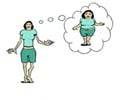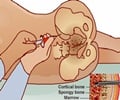Researchers have clarified with diverse diets on bone status and the role of resveratrol in CUG models.

As diet is a controllable factor, the influence of re-feeding with different dietary patterns on bone parameters is important to study.
Resveratrol has been attributed a number of beneficial effects in mammals including osteotrophic properties. Wang and colleagues have described the first study to describe the effects of CUG, with various diets and resveratrol intervention on bone status.
CUG can lead to insulin resistance and low-grade systemic inflammation occurs in insulin resistance syndrome.
Tumour necrosis factor (TNF)-a is an important inflammatory cytokine, and Lange and Seriolo et al. indicated that anti-TNF alpha therapy may exert beneficial effects on bone metabolism, prevent structural bone damage and increase bone mineral density.
"Our results showed that food restriction induced a significant decrease in bone parameters. Eight-week CUG by normal chow demonstrated a greater degree of improvement in mineral density than a high-fat diet, and even returned to normal level," Dr. Wang said.
"Compared with neural anorexia, we found in this study the degree of impairment by four-week diet restriction on bone metabolism was relatively weaker, so that bone mineral density returned to normal level after re-feeding."
Their results showed that bone parameters in the high-fat diet group were markedly higher than either the normal control or the re-feeding with high-fat diet group.
The higher serum TNF-a level in the CUG by high-fat diet group along with a lower body weight may partially explain the decline in bone parameters compared with the high-fat diet group.
In the resveratrol intervention groups, bone parameters significantly increased.
Furthermore, bone parameters were inversely related with serum TNF-a concentrations, but showed positive correlation with body weight.
In conclusion, the study shows that CUG can partially reverse the deleterious effects of caloric restriction on bone health, especially in re-feeding with normal chow group.
Moreover, resveratrol has protective effect on bone status during the period of CUG, but the exertion of this protective role depends on sufficient nutrition supply.
Serum TNF-a levels and body weight also seem to play an important role in regulating bone parameters. Resveratrol has anti-inflammatory effects, increases bone formation but inhibits excessive weight gain. This can be used as a template for synthesizing new drugs, providing a large potential for treatment of overweight and osteoporosis groups.
"Wang and colleagues have demonstrated that re-feeding with a normal diet showed a larger improvement in bone mineral density than a high-fat diet," Steven R. Goodman PhD, Editor in Chief of Experimental Biology and Medicine said.
"Resveratrol has also been demonstrated to have a protective effect on bone status during the period of catch up growth.
"As serum TNF-a levels and body weight also appear to play a role in regulating bone parameters this study may have important implications for the treatment of obesity and osteoporosis," Goodman added.
The study has been published in Experimental Biology and Medicine.
Source-ANI
 MEDINDIA
MEDINDIA



 Email
Email










